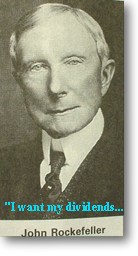On Thai Stocks Dividend payouts.
Below is a member posting to our "member only" lounge -and how I answered. We regularly get quality feedback, critique, added value comments and special insights as posted by our many seasoned Thai investors/members.
"I looked at random at the stated dividend policies of some companies on <stock information-basic information-statistical data> and found the following on the bottom line:
HEMRAJ -> Not lower than 50% of net profit
MACO -> Not less than 40% of net income after taxes
MODERN -> Not less than 60% of net profits
OGC -> Not loweer than 60% of net profits
TIPCO -> Not lower of than 60% of net profits
TUF -> About 50% of annual profit
These are statements supplied to the SET! But this is not what the companies distributed. As a long-term investor, my dividends in 2004 were half of 2003. The reason for this is that the Board of Directors of Companies vote whatever dividend they want. This total lack of Corporate Governance and shows little respect for the stockholders. This lack of management visibility does more harm to the SET than the bird flu or the high price of crude oil. In fact, it turned the THAI market from one of the best in the world to one of the worst. This explains also the huge flight of foreign investors in 2004. And this in years where profits have increased at an ever accelerating pace". Mike1
August 17 '04

"....Not all of us agree, as many want long term growth as well... -and developed countries have no better reputation with their grotesque executive compensation and rip-off golden parachutes, on top of the meager if any dividends. Foreign capital is consolidating in general around the world, not just out of Thailand! It the foreign money goes elsewhere, tell me, where is it that much better".
Paul Renaud. August 17 '04
"Actually there is an academic point to be made here:
"A CEO is committed to first and foremost maximize profits for his company. (Of course, within legal means and there are some exceptions where management claims it "optimizes profits" which often means it runs the firm for its employees first and foremost, and profits secondary).
"In Finance we can show exactly where a firm's optimal capital structure rests. Meaning, at what exact level of debt as a percent to equity, should this particular firm ideally be running on. This is called the Optimum Capital Structure (OCS). It is company specific and takes into account various internal and external variables, like interest rates and existing debt and cost of new debt etc.. but at the end of the math, an ideal capital structure emerges clearly. Giving us the exact ratio of debt to equity, which would be ideal and so to maximize profits. (The Maxima point).
"If one deviates from this OCS point, for example, by paying out too much in cash dividends resulting in a less then optimum capital structure, then shareholders could rightly claim that this firm is not maximizing profits. Hence its primary objective is undermined and subject to criticism.
"In my experience, especially the Engineers, often get this wrong thinking that "the less loans the better" or, that dividend pay-out ratio's must be maintained, regardless of new expansion or unexpected contraction by the firm. Ah, no Monsieur.
"Hence, Ocean Glass (OGC 64), as just one example, reduction of the dividend pay-out ratio makes sense in the light of expanding with a new 1 Billion Baht smelter to increase glass production by some 1/3 next year." Although we liked OGC in the past, it is not a stock we now view favorably.
Paul A. Renaud,
August 23 '04.
***
Some questions of concern by us, for a long time:
1) Why have the local authorities never introduced an alternative to the large cap biased SET benchmark index? May we please have an alternative index so to better gage true SET performance; not market capitalized weighted performance. Surely, two ways of looking at things is always better then just one. 3) Why are most of all research budgets and analysis spent on analyzing such long and proven laggards? Why are 2/3 of all SET listed companies never visited nor covered by any analysts? Evenwhile some of those are most attractive investments.
2) Why are all brokers continuously & relentlessly bullish on Bank stocks when the relative performance graphs (even without the Ex-bank factor) shows half a decade of underperformance. Bank shares have for a very long time, underperformed the SET index averages.
4) Why does Thailand have one of the largest GNP per Bank loans ratio of any country in the world? What does that say about Thai savings intermediation!
5) Why do Thai brokers not advocate a seperate trading and then investing account? Instead of forcing on the dangerous "investor cocktail trap" by mixing the two seperate strategies into one account. It is definetly not against SEC nor SET rules to have two separate accounts with the same broker. This is only the brokers' own internal stubborn rules -and so lack of professional standard, in my view.

